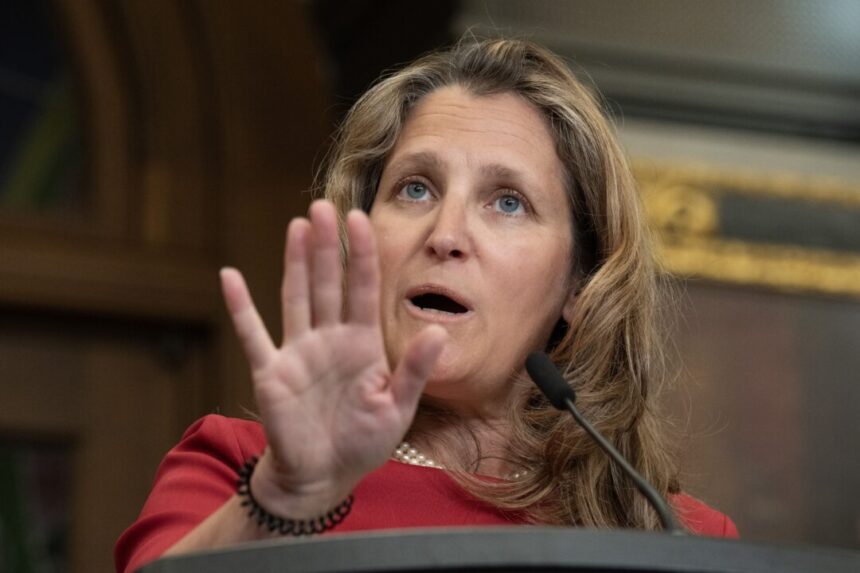Finance Minister Chrystia Freeland is set to unveil a plan on the morning of June 24 to potentially impose tariffs to safeguard Canada’s electric vehicle supply chain from unfair competition from China.
Ms. Freeland, along with International Trade Minister Mary Ng, will be making a joint announcement today following similar actions taken by the United States and Europe to raise import tariffs on Chinese-made EVs earlier this year.
Prior to implementing new tariffs, Canada must await the completion of an anti-subsidy investigation by the Canadian International Trade Tribunal.
Currently, the only Chinese-made EVs imported into Canada are Teslas manufactured at the U.S. company’s Shanghai factory.
China plays a significant role in Canada’s electric vehicle industry, particularly in batteries and battery components, where Canada has made substantial investments in the past four years.
In 2021, nearly 80% of all lithium-ion batteries for electric vehicles worldwide were produced in China, and the International Energy Agency reports that almost 60% of global EV sales are now of Chinese origin.
Allegations of unfair subsidies by China to boost its own EV industry prompted retaliatory measures from both Europe and the U.S. earlier this year.
President Joe Biden announced in mid-May that tariffs on Chinese EVs would be increased from 25% to 100% this year, even though there is only one Chinese EV model available in the U.S.
Additionally, Mr. Biden announced tariff hikes on lithium-ion batteries and other clean energy products such as solar cells.
The European Commission is finalizing its anti-subsidy investigation but stated two weeks ago that it would implement provisional tariffs ranging from 17% to 38% on Chinese-made EVs starting July 4.
However, this plan could be subject to change as negotiations between Europe and China are set to take place following recent developments.
Chinese-branded EVs now hold an 8% market share in Europe, up from 1% in 2019. Europe’s initial findings indicated that Chinese EVs are benefiting from “unfair subsidization.”
Many Chinese EVs are significantly more affordable than their European counterparts.
The decision on tariffs in Canada will be determined through a consultation process. A government source, speaking on the condition of anonymity, mentioned that a brief consultation period typically precedes the imposition of specific tariffs.
Prime Minister Justin Trudeau has emphasized Canada’s close observation of the situation and its decision-making process following the U.S. announcement.
On June 12, when the European Commission announced its provisional tariffs, Ms. Ng stated that Canada was actively working on its own strategy.
“We are working on it, and I’ve been very clear about this,” she stated. “This is an issue of concern for us.”
Ms. Ng mentioned that she was already engaging with the Canadian industry.
Usually, the process of initiating an anti-subsidy investigation begins with a complaint from the industry.
“We have made significant investments in the electric vehicle supply chain,” she added.
Since 2020, Canada has attracted over $46 billion in investments for 13 electric vehicle, battery, and battery component manufacturing projects. Both the federal government and the provinces have collectively pledged up to $53 billion in incentives, including tax credits, production subsidies, and capital investments.








